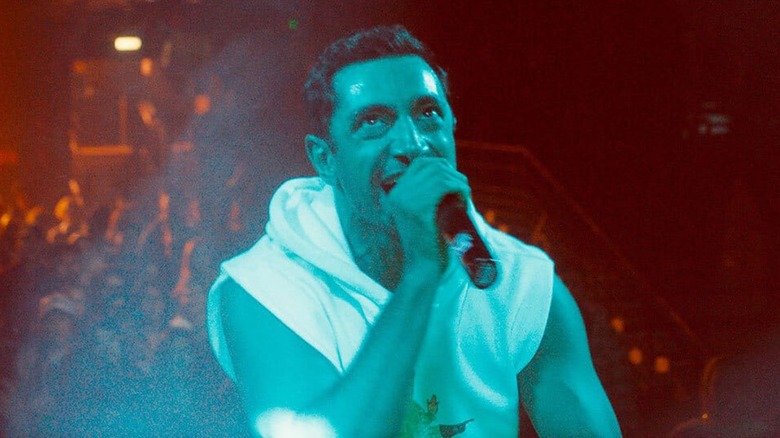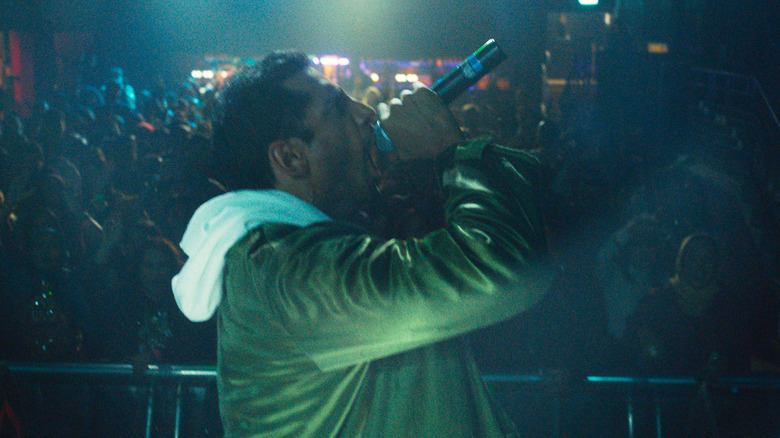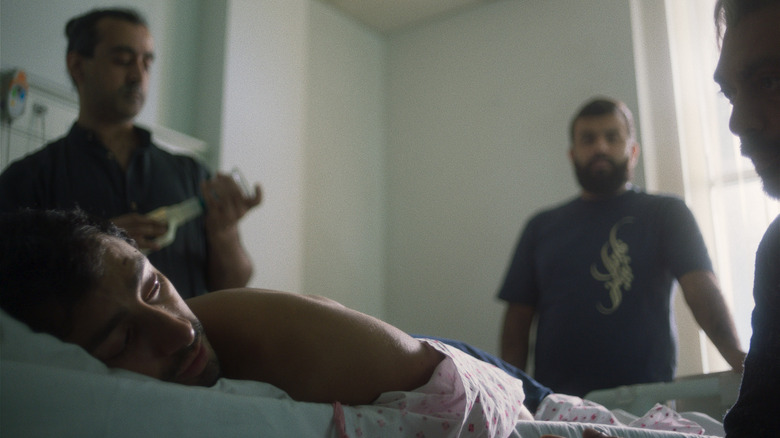Mogul Mowgli Review: Never Go Home Again
The act of live performance in any musical genre, of an artist presenting themselves to the public, comes with some measure of artifice. No matter how raw or uncut a musician's outer persona may be, no matter how much authenticity it is couched in, there is always a willful act of identity building at the core of what they do anytime they step onto a stage or into a recording booth. "Mogul Mowgli," the new Riz Ahmed vehicle, deftly explores the unspoken other side of that destructive creation, addressing the original self an artist often leaves behind and what havoc that deceptive transformation can wreak on one's spirit and body.
The film, director Bassam Tariq's feature debut, was co-written with Ahmed, both drawing from their experiences as British-Pakistani artists exploring a debilitating drift from their cultural heritage. But rather than a solemn rumination on such heady themes, it's a surreal, visceral, and — most thankfully — brusque burst of expression. On paper, this could have been a drab exercise, but the film's intensity and sharp wit give it a much-needed edge.
If the film has any potential drawbacks, they're all surface level, with the anticipatory cringe of whether or not Ahmed's real-life forays into rap music will translate to the big screen and the unfortunate sense of deja vu between this film's premise and his last feature outing, which earned him an Academy Award nomination.
Stop me if you've heard this one before...
In "Mogul Mowgli," Ahmed plays a musician about to embark on an important tour sidelined by a new medical ailment that forces him to re-evaluate the world and his place in it, which is exactly how one could describe "Sound of Metal," his last starring effort that garnered near-universal praise. But the films are otherwise worlds apart.
Instead of playing a drummer who loses his hearing, Ahmed plays Zed, neé Zahir, a rapper who's worked tirelessly for years to get signed and reach a larger platform. When we meet him he's about to become the opening act for a bigger artist, but days before the tour is set to begin, he begins wrestling with a degenerative auto-immune disease that affects his motor functions and ability to stand, much less walk. But where Ruben's hearing loss in "Sound of Metal" was a predictable development from his years spent around obscenely loud music, Zed's predicament feels more metaphysical in nature.
At the behest of his girlfriend Bina (Aiysha Hart), he heads back home to the UK to see his family for the first time in two years. As presented, this return to his roots, and the resulting dissonance to be found between his new life and his old one, feels like a system shock that psychosomatically affects his entire body, putting him out of commission until he's ready to reckon with who he truly is.
This means even drab scenes of Zed in a hospital bed are interpolated with maddening dream sequences and nightmarish illusions turning his struggles into supernatural battle raps with manifestations of his faith and fears. The film becomes a harried and spiritually exhausting journey for a man forced to confront who he has become, with a brilliant central performance from Ahmed and a showcase strong enough for director Tariq that he's been courted by Marvel to direct the MCU reboot of "Blade."
It's a heartfelt but thorny reckoning with the way becoming so purposely detached from your roots can leave you endlessly adrift in an uncertain world, so much so that your mind and body may fail you when your spirit can no longer keep up with the charade.
Remember who you are
Early in the film, Zed's girlfriend confronts him with a hard truth. "For someone who raps so much about where they came from," she asks, "when was the last time you went home?" But it's clear she doesn't just mean home as a physical space, or home as where his folks live, or even home as a stationary place they can be together when he isn't jetting to perform for strangers instead of nurturing their troubled relationship. She's talking about this death by a thousand cuts he's been dying for years of distancing himself from his truth despite the hollow boasts to the contrary in his vicious rhymes.
Watching him in his new habitat, Zed seems so alive and sure of himself. He's brash but also kind of a prick, both to Bina and to his manager Vaseem (Anjana Vasan), the two women suffering his selfishness on a daily basis. Even though his raps are so explicitly about his heritage and how that makes him different, he seems casually disinterested in if not openly contemptuous of his own culture. There's a cynicism to Zed about the world he lives in, one where he had to anglicize his own name, and where he admonishes someone for planning not to do the same for their future children. It isn't that he's not proud, so much as that he lives in a world where pride is a luxury he sees as antithetical to his artistic aims.
But as he returns home and spends more time around his family, as the difficult relationship with his father (Alyy Khan) becomes more prominent, Ahmed as a performer begins to more beautifully show the cracks in Zed's mask. There's a great scene where Zed runs into a fan outside of mosque, where he's snuck out back from prayer to smoke a spliff. The fan tells him it's improper not to pass your brother something with your left hand, causing Zed to angrily remark that it's haram, and it's going to be haram no matter what hand he uses, seemingly laughing off the intricacies of their faith, only for the fan to school him on how it's not a sin, and that calling something that isn't a sin "a sin" is a sin.
Within this exchange (and the ensuing reality that this fan thought Zed was a rival artist he hates), his journey becomes clear. Zed's confidence and sureness in his new persona are a feint designed to help him navigate the world of pre-fame, but the armor he has built up for this war prove insufficient cover from the arrows and slings of modernity. To truly handle himself going forward, he has to face the past first and reject the lies he's been told by the world, and the ones he has told himself.
When his physical therapy and treatment isn't going well, there is a scene where he begins retrieving more holistic aid in secret, while his father tells him "you don't need their poison." He's speaking of course of the work the hospital is trying to do, specifically, but also of the world Zed so deeply wants to conquer, despite feeling like he can't do so as his true self.
In a longer, more insular movie, these themes might prove too self-serious to truly resonate, but Tariq keeps things moving at a speedy clip, buoyed by enough humor ("don't you take J Dilla's name in vain!") to make the process more entertaining than exhausting. "Mogul Mowgli" once again proves Riz Ahmed is one of our finest actors, and hopefully bodes well for him taking more authorship in his future work.


